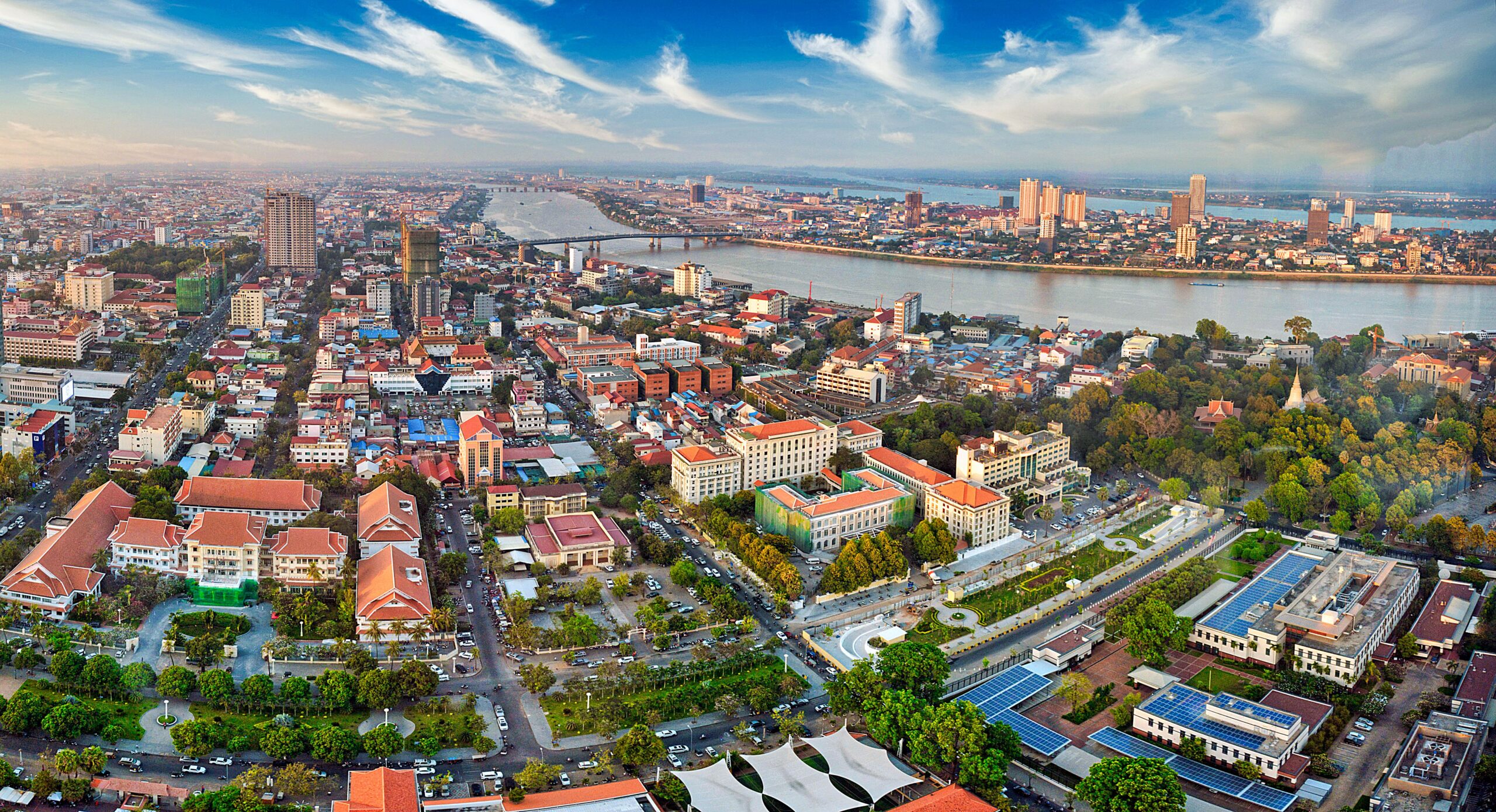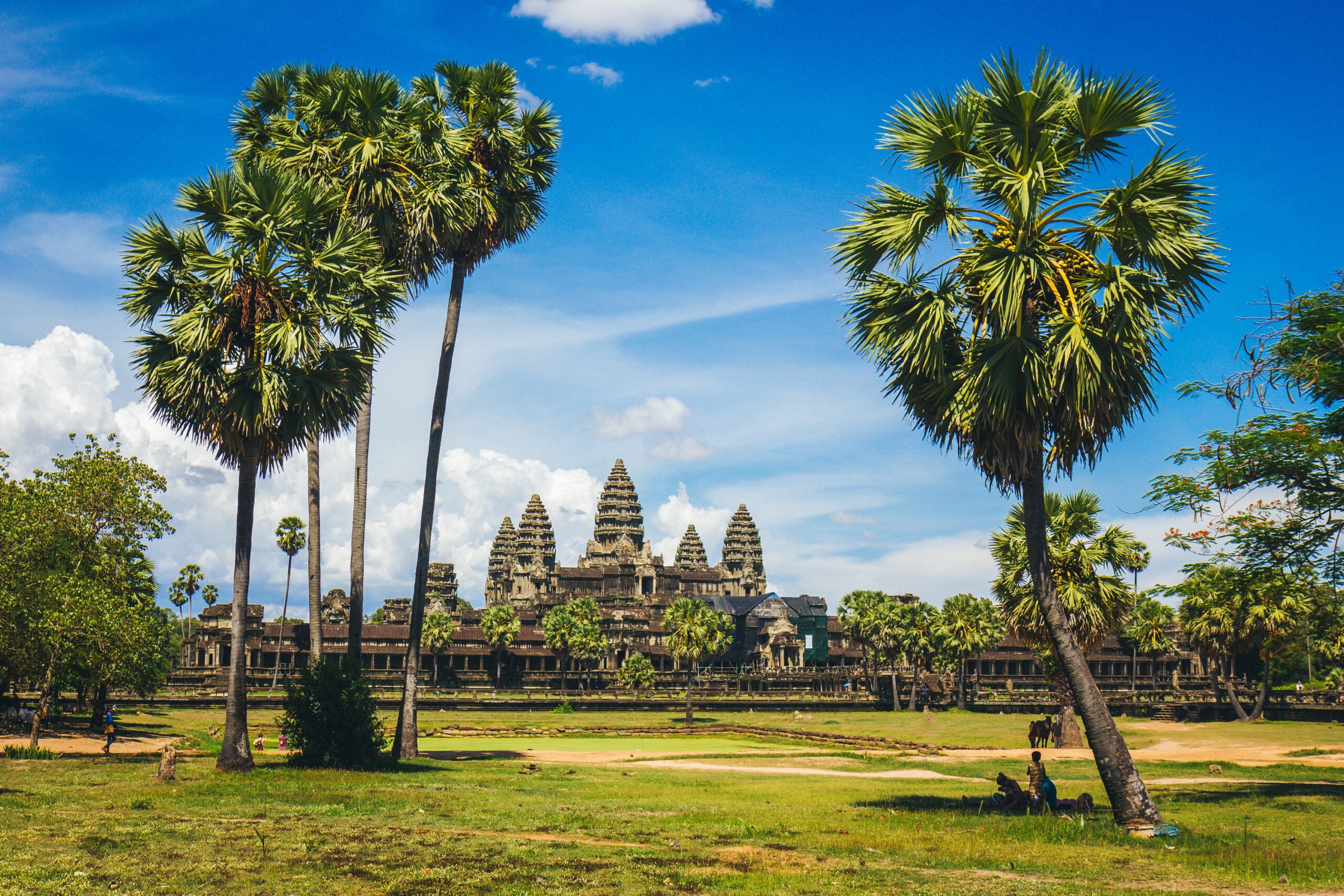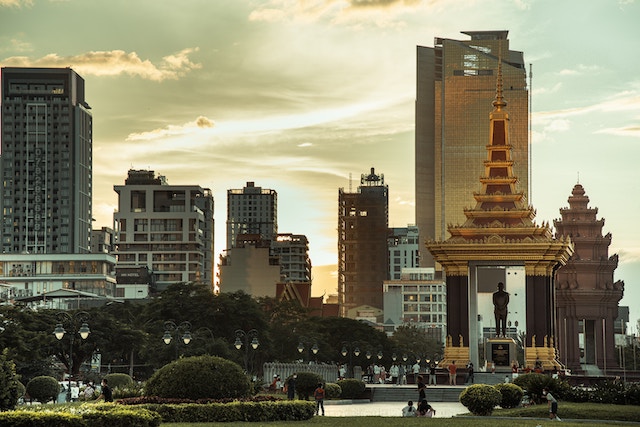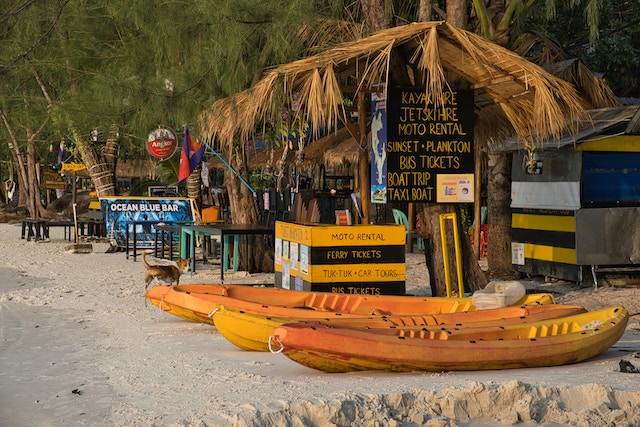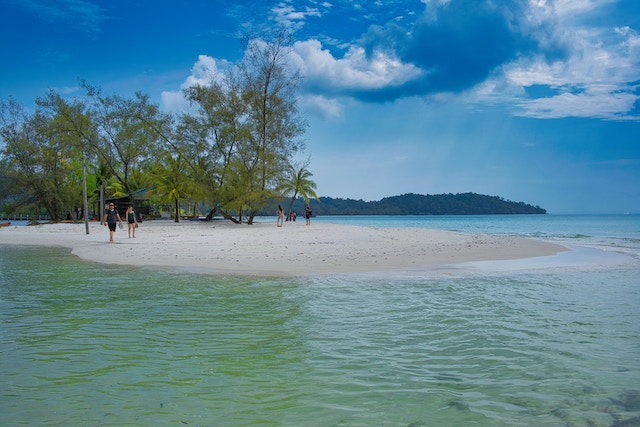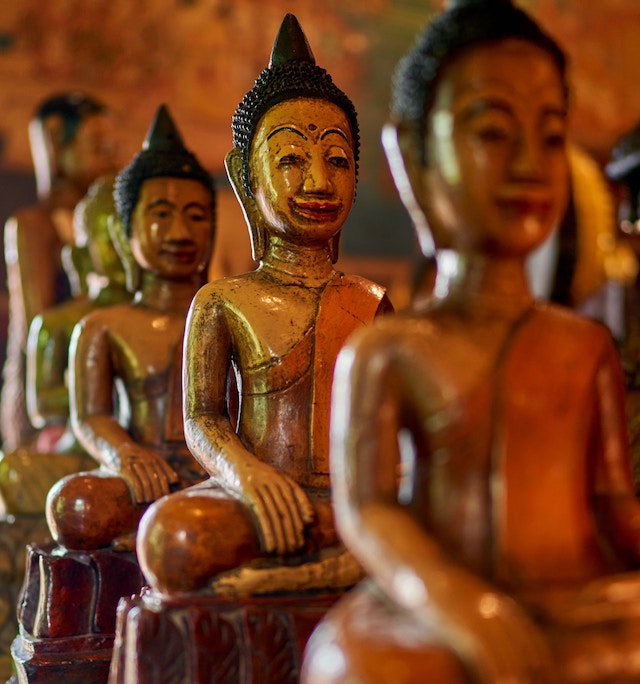Yes, US citizens must have a visa, such as a business visa, tourist visa, ordinary visa, or electronic visa, to enter Cambodia.
Your Comprehensive Guide to Obtaining a Cambodia Visa
A country where the past meets the present, Cambodia sits like a hidden gem in the heart of Southeast Asia. Best known for the awe-inspiring Angkor Wat, one of the largest religious monuments in the world, the country showcases an intricate tapestry of ancient ruins, cultural richness, and vibrant city life.
The capital city, Phnom Penh, offers glimpses of royal grandeur via the Royal Palace and the Silver Pagoda, while bustling markets echo local life and traditions. Beyond the cities, Cambodia’s charm extends to serene landscapes, from the crystal-clear waters and golden sands of the southern coast to the lush jungles of Mondulkiri in the north.
A visit to Cambodia is a journey into a captivating land, filled with warm smiles, tantalizing cuisine, and tales told in the stones of ancient temples. Whether exploring its heritage or basking in the serenity of its natural beauty, Cambodia promises an unforgettable travel experience.
Essential Travel Information
-
Official language
Khmer
-
Time Zone
Indochina Time, UTC+7
-
Climate
Cambodia has a tropical climate, with two seasons: the rainy monsoon season, from May to October, and the dry season from November to April. The average temperature is around 27°C to 35°C (80°F to 95°F) year-round.
-
Country Calling Code
+855
-
Electricity
230V/50Hz; type A, C, and G plugs
-
Capital City and US Embassy
Phnom Penh
-
Currency
Cambodian riel (KHR; ៛); US dollar (USD; $)
Unlocking the World: Adventures Await on Your Traveler's Path
Get your VISA- Do US Citizens Need a Visa for Travel to Cambodia?
- Cambodia Visa Requirements for US Citizens
- General Travel Requirements to Enter Cambodia
- Cambodia Travel Restrictions
- Health and Safety in Cambodia
- Local Laws for Travelers to Cambodia
- Money, Banking, and Currency in Cambodia
- Preparing for Your Cambodia Trip
Do US Citizens Need a Visa for Travel to Cambodia?
Cambodia Visa Requirements for US Citizens
To enter Cambodia, you’ll need a valid passport and a Cambodian visa. Both tourist visas and business visas remain valid for one month from the date you enter Cambodia. Tourist visa and business visa processing can be done online or in person at the Cambodian Embassy in Washington, DC.
Visitors, such as tourists, business travelers, and diplomats, can also obtain visas upon arrival at the airports in Phnom Penh, Siem Reap, or at any major border crossing. Note that Cambodian immigration officials at airports now collect fingerprints using an inkless electronic process. Ensure your passport is valid for at least six months beyond your entry date into Cambodia.
If your stay extends beyond the authorized period, you may face a fine of $10 per day from Cambodian immigration officials. Overstaying significantly may lead to arrest or detention by local police, as well as official deportation proceedings at your own cost. Deportation could also restrict your ability to re-enter Cambodia in the future.
For the most up-to-date visa information, consult Entriva’s travel map or contact the nearest Cambodian embassy.
Cambodia Tourist Visa
There is a tourist visa available for foreigners who want to visit Cambodia. It is a single-entry visa, valid for three months from the date of issue for a stay of no more than 30 days (and is extendable for another 30 days). In addition to the mandatory government fee of $36, Entriva charges amongst the industry’s lowest handling fees, starting at just $50.
Cambodia Business Visa
The Business Visa (E) for Cambodia has a validity of three months from the issue date and allows a maximum stay of 30 days. This visa grants a single entry only. If your business requires a longer stay, you can extend your Business Visa (E), provided you have appropriate business-related documentation to support your request. The Cambodian government fee for this visa is $36, plus Entriva’s handling fee.
General Travel Requirements to Enter Cambodia
To enter Cambodia, visitors must first meet a set of critical requirements, most essentially possessing a valid passport with at least six months of validity beyond the intended date of entry into Cambodia. Apart from a few exceptions, all foreign nationals are also obliged to have a full visa on arrival.
There are two primary types of visas: a tourist visa and a business visa, both allowing a stay up to 30 days. Visa applications can be made online for an e-Visa or obtained on arrival at major airports and border crossings.
For a smooth and safe travel experience, it’s essential to discuss personal health risks and get any required or recommended vaccines or medications prior to your journey.
Although Cambodia does not mandate specific vaccinations for entry, it is advisable for travelers to be up-to-date with routine immunizations. These typically include measles-mumps-rubella (MMR), diphtheria-tetanus-pertussis, varicella (chickenpox), polio, and your annual flu shot. Travelers are also often recommended to have vaccinations for hepatitis A and typhoid, due to potential exposure through contaminated food or water.
Malaria can be a risk in some parts of Cambodia, so travelers should consult with their healthcare providers about possible anti-malarial medication, depending on their itinerary.
Cambodia Travel Restrictions
There are no longer COVID-19 restrictions in place for entry into Cambodia. However, you should still be aware of the risks of the virus and take precautions, such as getting vaccinated and wearing a mask in public places.
As of July 24, 2023, the US State Department set a Level 1: Exercise Normal Precautions travel advisory for American citizens in Cambodia. Overall, travelers should exercise normal precautions, though some areas have increased risks and therefore require increased precautions.
There is a Level 2: Exercise Increased Caution alert in Phnom Penh due to crime, including phone and bag snatchings, sexual assault, and homicide, in areas where foreigners congregate. There’s also a Level 2 advisory in remote areas of Siem Reap and other provinces due to unremoved land mines.
Consult the Cambodia Ministry of Health for the latest travel advisories and the US Centers for Disease Control and Prevention (CDC) for the most recent recommendations regarding travel to Cambodia.
For more up-to-date information about travel restrictions to Cambodia, check Entriva’s travel map, or with the US State Department and the US embassy in Cambodia.
Health and Safety in Cambodia
In addition to keeping up-to-date with routine vaccines, as well as vaccinations for hepatitis A and typhoid, anti-malarial medication may be recommended based on your itinerary. Travelers should consult with a healthcare provider to assess their personal health risks and to receive any additional vaccinations or medications as advised by medical care.
Travel medical insurance is always recommended. Shop around for a plan that covers care at high-quality medical facilities and medical evacuation in case of emergency.
When it comes to natural disasters, Cambodia is prone to flooding, droughts, and tropical cyclones. If you are planning to travel during the monsoon season (June to October), be sure to check the weather forecast and be prepared for potential disruptions.
Local Laws for Travelers to Cambodia
Here are some relevant laws and customs travelers to Cambodia should know:
- Dress Code: Be respectful of local customs and dress modestly, especially when visiting religious sites. This means covering your shoulders and knees.
- Photography: Ask permission before taking pictures of people, especially monks and other religious figures.
- Drugs: Drugs are illegal in Cambodia, and penalties for possession, distribution, or manufacture are severe.
- Sex with Minors: Sex with a minor under the age of 18 is illegal in Cambodia and can result in imprisonment.
- Bribery: Corruption is a problem in Cambodia, and there have been cases of tourists being asked for bribes by police officers. It is important to be aware of this and to avoid paying bribes, as this could lead to further problems.
- Land Mines: Some parts of Cambodia are still contaminated with land mines. If you are planning to travel to rural areas, be sure to check with local authorities about the risks.
Here are some additional tips for travelers in Cambodia:
- Learn some basic Khmer phrases. This will help you communicate with the locals and make your trip more enjoyable.
- Be respectful of local customs and traditions. This will show your appreciation for the culture and help you avoid any problems.
If you’re arrested and imprisoned in Cambodia, seek legal assistance and alert your country’s embassy or consulate immediately. They should be able to offer advice on next steps.
Money, Banking, and Currency in Cambodia
In Cambodia, the official currency is the Cambodian riel (KHR; ៛), but the US dollar is also widely used and accepted throughout the country. The dual-currency system is relatively straightforward—for small purchases, such as street food or local market items, riel is typically used, while for more significant expenses, like hotel bills, overseas medical costs, or expensive meals, the US dollar is commonplace.
ATMs dispensing both US dollars and Cambodian riel are abundant in major cities and tourist areas, but it’s recommended to carry a sufficient amount of cash when traveling to more remote areas, where ATMs and credit card facilities might be scarce. Also, it’s good to have small denominations of both USD and riel for convenience in daily transactions.
Cambodia has a growing banking sector, with several national and international banks operating across the country. If you’re staying for an extended period and need to open a bank account, you’ll typically need your passport, proof of address, and some banks may require a minimum deposit. However, for most tourists, this isn’t necessary.
Credit cards are increasingly accepted in hotels, upmarket restaurants, and shops, especially in larger cities and towns. But it’s good to check in advance if credit cards are accepted, particularly in smaller establishments or in the countryside, to avoid any inconvenience.
It’s always advisable to inform your bank of your travel plans to ensure uninterrupted service and avoid any issues related to foreign transactions.
Preparing for Your Cambodia Trip
Obtaining a visa is an essential part of planning your trip. At Entriva, we can easily and efficiently help you with every aspect of getting a Cambodia visa. Start your visa application process.
Essential Travel Information
-
Official language
Khmer
-
Time Zone
Indochina Time, UTC+7
-
Climate
Cambodia has a tropical climate, with two seasons: the rainy monsoon season, from May to October, and the dry season from November to April. The average temperature is around 27°C to 35°C (80°F to 95°F) year-round.
-
Country Calling Code
+855
-
Electricity
230V/50Hz; type A, C, and G plugs
-
Capital City and US Embassy
Phnom Penh
-
Currency
Cambodian riel (KHR; ៛); US dollar (USD; $)
Unlocking the World: Adventures Await on Your Traveler's Path
Get Travel Visa



